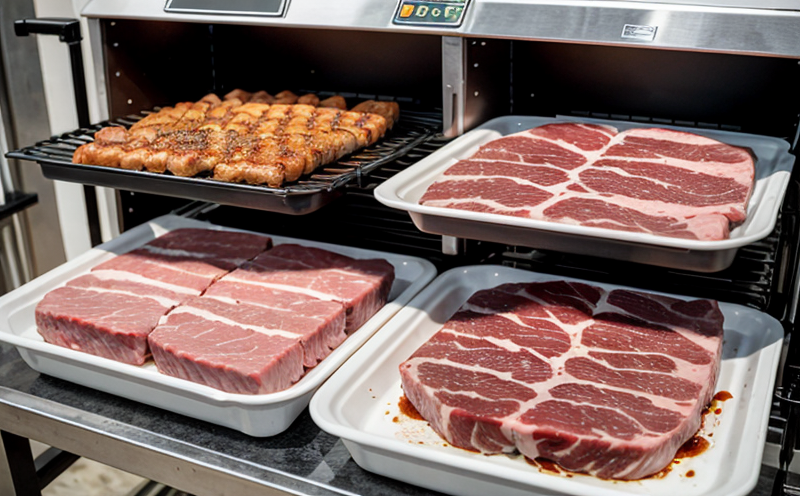ISO 24333 Multi-Residue Contaminant Screening in Poultry Meat
The ISO 24333 standard provides a comprehensive framework for detecting multiple residues, including pesticides, veterinary drugs, heavy metals, and other contaminants, in poultry meat. This service is crucial for ensuring the safety and quality of food products in the global market. The test protocol involves advanced analytical techniques to screen for over 500 potential contaminants simultaneously.
The process begins with sample collection from various sources such as farms, slaughterhouses, and retail outlets. Samples are prepared by homogenizing them into a uniform mixture, followed by extraction using appropriate solvents. This step ensures that all residues are released from the food matrix for accurate quantification.
The extracted samples undergo purification to remove interfering substances before being analyzed using liquid chromatography coupled with tandem mass spectrometry (LC-MS/MS). This method offers high sensitivity and selectivity, making it suitable for detecting trace levels of contaminants. The equipment used in this process includes state-of-the-art LC-MS/MS systems compliant with ISO standards.
The analytical results are compared against established limits set forth by international regulatory bodies like the European Union (EU), United States Food and Drug Administration (FDA), World Health Organization (WHO), and Codex Alimentarius Commission. Compliance with these regulations is essential to ensure food safety and protect consumer health.
Our laboratory adheres strictly to ISO 24333 guidelines, employing experienced analysts who have undergone rigorous training in this specialized field. We maintain up-to-date knowledge of regulatory changes and provide clients with detailed reports outlining the findings along with recommendations for corrective actions if necessary.
The importance of this service cannot be overstated given increasing public awareness about food safety issues worldwide. By offering ISO 24333 compliant testing, we help our clients stay ahead of evolving standards while maintaining their reputation as leaders in quality assurance.
Our team works closely with clients throughout the entire process—from initial consultation through final report delivery—to ensure that every step aligns perfectly with industry best practices. This collaborative approach allows us to deliver accurate results quickly and efficiently, helping our customers make informed decisions about product safety and compliance.
In addition to routine testing, we also offer custom solutions tailored specifically to individual client needs. Whether you require regular monitoring or one-off assessments, our flexible service offerings cater to diverse requirements across the food industry spectrum.
By leveraging advanced technology and adhering strictly to international standards, we provide peace of mind knowing that your products meet strict regulatory requirements. Our commitment to excellence ensures that you can trust us with your most critical testing needs related to ISO 24333 multi-residue contaminant screening in poultry meat.
Industry Applications
The application of ISO 24333 standards extends beyond just the laboratory setting; it plays a vital role in ensuring food safety across various sectors within the agriculture and food processing industries. Farmers benefit from early detection of potential issues that could affect crop yields or animal health, allowing them to implement preventive measures promptly.
Slaughterhouses use this technology to monitor post-harvest practices and ensure consistent quality throughout the supply chain. Retailers rely on these tests to maintain brand integrity by verifying compliance with local laws and international agreements before putting products on store shelves.
R&D departments within large corporations invest in such analyses to stay ahead of emerging trends and innovations, ensuring that new formulations or processes do not inadvertently introduce harmful substances into the food supply. Procurement teams leverage these insights when sourcing raw materials from trusted suppliers who adhere strictly to strict quality controls.
The widespread adoption of ISO 24333 compliance demonstrates a collective effort towards safeguarding public health and promoting responsible business practices. Through rigorous testing procedures, stakeholders across the entire value chain can contribute positively toward creating safer food environments worldwide.
Quality and Reliability Assurance
The reliability of analytical methods is paramount when it comes to ensuring accurate results under ISO 24333 standards. At our laboratory, we have implemented robust quality assurance measures at every stage of the testing process:
- Sample Preparation: Rigorous protocols are followed to ensure proper handling and preparation of samples.
- Purification Steps: Advanced filtration techniques eliminate any unwanted compounds that might interfere with subsequent analysis steps.
- Analytical Techniques: High-performance liquid chromatography (HPLC) coupled with mass spectrometry (MS) provides precise measurements even at very low concentrations.
- Data Analysis: Expert analysts interpret complex data sets using statistical software to identify trends and patterns indicative of contamination levels.
We continuously monitor our performance metrics against industry benchmarks to ensure consistent accuracy across all projects. Regular internal audits combined with external accreditation checks further reinforce our commitment to delivering reliable results consistently.
In addition, we employ cutting-edge technologies such as automated sample preparation systems and high-throughput screening platforms which streamline workflows significantly reducing human error while enhancing throughput capabilities. These investments reflect our dedication to providing clients with timely feedback backed by solid evidence derived from repeatable experiments conducted according to internationally recognized protocols.
Environmental and Sustainability Contributions
The pursuit of environmental sustainability goes hand-in-hand with the goal of food safety. By adhering strictly to ISO 24333 standards, we contribute positively towards reducing agricultural runoff containing harmful residues into water bodies affecting ecosystems downstream. Proper residue management helps prevent pollution incidents that could lead to long-term damage.
Furthermore, by detecting and addressing contamination issues early on, our services assist in minimizing waste generation associated with recall campaigns aimed at removing unsafe products from circulation. Such proactive approaches not only protect consumer health but also reduce unnecessary resource consumption linked to reprocessing or disposal activities.
Incorporating ISO 24333 compliant practices into daily operations fosters a culture of responsibility among all stakeholders involved in the food supply chain, encouraging continuous improvement efforts towards greener processes and more efficient utilization of resources. As leaders in this domain, we strive to inspire similar initiatives within our broader community.





